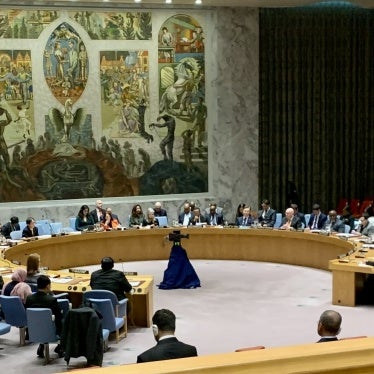(Geneva) - The UN Human Rights Council should draw attention to the neglected human rights crisis in Somalia, Human Rights Watch said today as the council began its first session of this year. The council, meeting in Geneva, should also intensify its engagement on the Democratic Republic of the Congo, Sri Lanka and Burma, Human Rights Watch said.
“Crises like those in Somalia and Burma quickly fall off the front pages,” said Juliette de Rivero, Geneva advocacy director at Human Rights Watch. “The Human Rights Council has a responsibility to keep such tragedies in the spotlight.”
Somalia
The UN Secretary-General’s independent expert on Somalia, Ghanim Alnajjar, will present his report on the human rights situation in that country, and the council will consider renewal of the expert’s mandate at this session.
The armed conflict in Somalia that began in late 2006 when Ethiopia ousted the Islamic Courts Union from Mogadishu has resulted in numerous violations of international humanitarian law by all sides. Ethiopian armed forces, troops of the Transitional Federal Government, and the insurgents have all been responsible for deliberate and indiscriminate attacks against civilians in the capital, Mogadishu.
Up to 400,000 people are estimated to have been displaced from Mogadishu since December 2006, with ongoing attacks, threats and violence provoking new displacement on a daily basis. Somali civilians have been terrorized by targeted and indiscriminate attacks, mass arbitrary arrests, and enforced disappearances.
The council should renew the mandate of the independent expert to ensure continued reporting on the dire human rights situation in Somalia. The council should also condemn the serious violations of international human rights and humanitarian law ongoing in the country, call on the primary armed actors – namely the armed opposition groups, the forces of the Transitional Federal Government, and the Ethiopian military – to immediately cease attacks on civilians, including humanitarian aid workers, facilitate humanitarian assistance and press for accountability for the crimes committed.
“Somalia is suffering through a major human rights crisis yet it’s almost invisible,” said de Rivero. “The Human Rights Council should break the world’s silence on Somalia and address the human rights tragedy that’s unfolding.”
Burma
Human Rights Watch said Burma is also in urgent need of international attention. In 2007, the council adopted two resolutions on Burma which urged the government to release those detained for engaging in peaceful protests, as well as all political detainees, including Aung San Suu Kyi, to lift restraints on peaceful political activities, to fully respect human rights, and to bring to justice perpetrators of human rights violations.
Today, Aung San Suu Kyi is still under house arrest, a number of those detained last September remain in prison, and just last month two journalists were arbitrarily arrested for investigating the international response to last year’s crackdown. While the independent expert appointed by the council to address Burma, Paulo Pinheiro, was able to visit the country in November, the government has failed to comply with the council’s calls to accept a follow-up mission to the country.
In the face of diminished international attention, the council must draw attention to these ongoing abuses. Burmese authorities should be pressed to comply with the council’s earlier resolutions by releasing all those arbitrarily detained, including Aung San Suu Kyi. The council should also take strong action to ensure that Burma allows the council’s expert to return to the country as soon as possible, and should renew the expert’s mandate as a matter of priority.
Democratic Republic of Congo
The council will also take up the renewal of the mandate of the independent expert for the Democratic Republic of Congo (DRC) at this session. Although presidential and parliamentary elections were held successfully in 2006, the DRC still has to overcome serious and widespread human rights violations, including arbitrary arrest and detention of people linked to the political opposition in Kinshasa, the use of torture, and accountability for war crimes committed during the armed conflict. The role of the independent expert is important in efforts to improve the human rights situation in the DRC and provide support to institution building. The council should renew this mandate as well.
In addition, recent events in eastern DRC demand targeted action by the council. A peace deal was reached in late January with the government and all armed groups in North and South Kivu, following a renewal of armed conflict in which more than 400,000 people were displaced, scores of civilians were killed or abducted, and widespread rape and looting and destruction of property occurred. That deal has seemed increasingly fragile in recent weeks, and the council could play a crucial role by creating a separate mechanism to monitor the implementation of the human rights commitments contained in the agreement.
Sri Lanka
Several reports in this session will draw attention to the deteriorating situation in Sri Lanka. The Special Rapporteur on Torture will report on his mission to Sri Lanka in October 2007. In addition, the Working Group on Enforced Disappearances will present its 2007 report in which Sri Lanka has the highest number of new cases of “disappearances” reported in the world. Assessments made by numerous independent experts who have visited the country and Human Rights Watch’s own research (“Return to War”) demonstrate the urgent need for an international human rights monitoring mission under UN auspices in the country. The council should take immediate steps to encourage Sri Lanka to cooperate in the establishment of such a mission.
“The Human Rights Council has a unique responsibility to address the desperate situations in countries like Somalia, Burma, DRC, and Sri Lanka,” de Rivero said. “Otherwise the council will be complicit in the neglect of human rights crises across the globe.”







